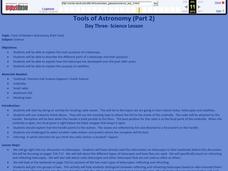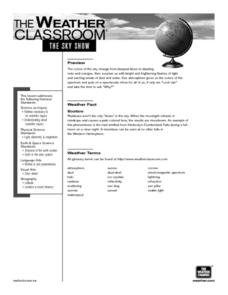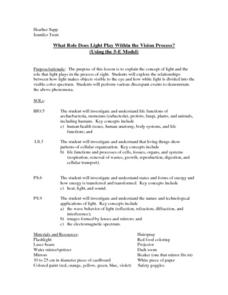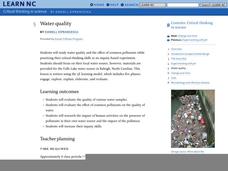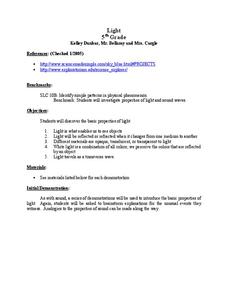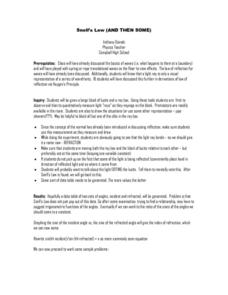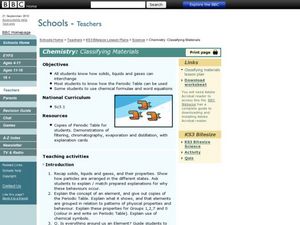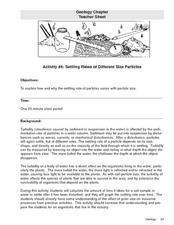Curated OER
Light
For this light worksheet, students read what makes light, the speed of light, and the electromagnetic spectrum. Students complete 12 matching, 8 fill in the blank, and 9 word problems.
Curated OER
Jell-O Optics
Students observe an activity with Jell-O to learn about optics. In this investigative instructional activity students fill out a handout on the activity that helps them to investigate the index of refraction and the speed of...
Curated OER
Radiation from Space
In this radiation worksheet, students review the different types of radiation waves that come from space and the different telescopes used to detect this radiation. This worksheet has 17 true or false questions.
Curated OER
Physical Optics: The Wave Nature of Light
Students are introduced to the wave nature of light. In groups, they discuss Young's experiment and how diffraction and interference demonstrate the wave nature of light. Using examples, they show constructive and destructive...
Curated OER
The Components of Light
Students are given a mnemonic device to review the light spectrum as it relates to the different components of refracted light. For this components of light lesson, students read Light Magic and review the properties of light. Students...
National Nanotechnology Infrastructure Network
Jell-O® Waveguide and Power Loss
Jell-O® can help model the transmission of light through fiber optic cables. Young scientists use the jiggly dessert to make a waveguide to transmit a laser beam from one point to another. Their models help them learn the function...
Rice University
College Physics for AP® Courses
Take a look at an organized physics course. The 34-section electronic textbook covers material in AP® Physics 1 and 2. Teachers use the text to supplement lectures and have the class work through the labs. Each section contains...
Curated OER
The Space Cadet's Laboratory: Using Electromagnetic Energy to Study Astronomy
Students build their own spectrophotometer to study light. In this physics lesson, students explain the dual nature of light. They calculate the angle of incidence and refraction using Snell's law equation.
Curated OER
Gallery Walk Questions on Earth's Radiation Balance
Questions that can be used in a instructional activity on Earth's radiation balance are suggested in this resource. It is not a lesson plan, per se, but it is a list of questions for stations within a "Gallery Walk" instructional...
Curated OER
Frozen Film
Students discover how light reflects off surfaces. In this hands-on demonstration, students examine how variations in color are produced by light interference.
Curated OER
Fish Tank Optics: Learning How Light Travels
Learners examine light waves and see how they travel. They explain that light moves in waves, which can bounce off of or go through materials. They use a flashlight to shine on a variety of objects.
Curated OER
Tools of Modern Astronomy
Young scholars differentiate refracting and reflecting telescopes. In this earth science lesson, students explain how they are closely connected to satellites. They complete the concept map at the end of the activity.
Curated OER
Sky Show
Students participate in a discussion of the sky and colors. They watch a demonstration of how colors can change. They examine the issue of if weather should be a part of their coursework.
Curated OER
What Role Does Light Play Within the Vision Process?
Students are introduced to the relationship between light and vision. In groups, they participate in experiments to discover how different wavelengths are divided in the visible spectrum. They record their answers and discuss their...
Curated OER
Water Quality
Students analyze water quality and turbidity of collected samples. In this physics lesson, students conduct tests to identify the suspended particles in the samples. They explain how human activities affect water quality.
Curated OER
Light
Fifth graders sit in their seats with the lights on and then the teacher turns off the lights. After their eyes have adjusted, they vote on what colors of construction paper are being held up. The lights are then turned back on and...
Curated OER
E3 Project Instructional Plan: Light
Eleventh graders investigate the nature of light. In this physics lesson, 11th graders determine how light intensity varies with the distance of the light source.
Curated OER
Snell's Law (And Then Some)
Students conduct an experiment to test Snell's Law using a block of lucite and a ray box. They measure the light rays as they impinge upon the block. Students are also asked to draw the situation of the lab or create a model of the...
Curated OER
Chemistry: Classifying Materials
Students classify materials. In this chemistry lesson, students examine the properties of solids, liquids, and gases. Students discover the elements, compounds, and chemical symbols.
Curated OER
Enlightening Explorations, Part III
Sixth graders continue their examination of light. In groups, they make rainbows and examine the spectrum of visible light. They travel between various stations recording their observations about the behaviors of light. To end the...
Curated OER
Settling Rates of Different Size Particles
Students discover how and why the settling rate of particles differs with the size of the particles. Using different soil samples, they calculate the amount of time it takes for a sample to settle in water for up to forty minutes. They...
Physics Classroom
The Physics Classroom: Sound Waves & Music: Reflection, Refraction, Diffraction
In this illustrated physics tutorial, students learn about sound wave behaviors and apply them to the reflection, diffraction, and refraction of sound waves.
CK-12 Foundation
Ck 12: Wave Properties
[Free Registration/Login may be required to access all resource tools.] Students investigate behaviors of waves, including interference, reflection, refraction, and diffraction.
Physics Classroom
The Physics Classroom: Light Waves and Color
The behavior of light waves is introduced and discussed. Also, polarization, color, diffraction, and interference are introduced and discussed thoroughly as supporting evidence of the wave nature of light.













